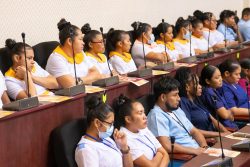The dream of owning one’s own home is probably a widely held aspiration for the remaining renter/landless class of Guyana.
One does however wonder how many more people are left to buy a house lot. Estimates on how many have been sold in the past 20 years are hard to fathom and perhaps reflect some exaggeration for political gains. One survey said 66,000 were sold by the government from 2000 to 2015, then the coalition sold 7,500, and so far the Ali administration says it has sold 19,000 as part of its goal of reaching 50,000 before the next elections. Add these up and you get 142,500 house lots. With an average household size of 4.3 persons that means 612,750 people – or more than three quarters of the population – have either moved into new homes or are planning to. In a population that has barely grown in the past 23 years, it simply does not add up. Also these figures don’t account for all the private communities that have sprouted up in recent years. So claims of individuals having multiple lots seem more plausible along with existing homeowners also receiving lots despite that not being allowed. Whatever the case Guyanese have an insatiable appetite for land and are fully invested in the concept of home ownership.
This was emphasised the other day when the opposition proposed a programme of assistance for low income tenants along with subsidies on electricity and water as part of offsetting the high cost of living and promoting the equitable distribution of the oil wealth we hear so much about. VP Jagdeo was quick to dismiss the proposal claiming the opposition wanted to have people be ”tenants all their whole lives”. The first thing to note is that without tenants you can’t have landlords. That includes several members (Jagdeo included) of the government, one of whom boasts of having as many as 19 properties. There is also a disdain contained within the remark as if renting was somehow an inferior living condition. It is not, although slumlords, of which Guyana has its share, along with inadequate legal protections often make it a stressful and tenuous arrangement. In fact some of the highest rates of renting as opposed to home owning are in far more developed countries than Guyana – Germany (50%), Austria (45%) and Denmark (41%).
One can’t help feeling upon hearing that remark and Jagdeo’s previous comment that unemployed people are just “damn lazy”, that the PPP/C believes poverty is some self-inflicted condition. How far the party has strayed from its roots of class struggle to the cultivation of a petit bourgeoisie focused on banal materialism. An air fryer in every kitchen, a reconditioned car in every driveway.
The bigger question is whether homeownership is for everyone and that is more complex than just the simplistic idea of having “a place of one’s own” although that is a compelling and emotional aspiration to many. If for example you have been renting and working in Georgetown for years how sensible is it to buy a house lot out in Parfaite Harmonie? Your commuting costs will probably run you an extra $40,000 per month for a family of four because you know there still aren’t any school buses, and you will spend perhaps 15 hours per week simply travelling to and from work instead of using that time to spend with your family. Also you will move from a community who you know and who knows you and hopefully looks out for each other, to living alongside strangers who happened to pull a chit out of a bag with a number close to yours. Some of these schemes are bereft of any amenities from health centres to playgrounds. They are characterless dormitories for the masses to grab some sleep in before heading off to work. As for the cost of construction a mortgage is a must and even here the financial benefits do not necessarily add up. Even a low income mortgage from NBS for a basic $10M house will run you $70,000 a month and you will pay $6.8M in interest over 20 years. Now some will claim that this is a form of savings and that you will build equity in your home. Maybe in another country but does anyone think you can easily sell one of these low income homes in the Back of Beyond’s Ville? Some of those homes look like they won’t last the lifetime of the mortgage anyway. Finally despite the mantra about how “they are not making any more land” just consider the housing crash in 2008 in the United States. In our wild west rodeo economy anything can happen.
One really has to wonder why this government is so intent on pushing home ownership. Some cynics have suggested that it helps to pacify the population. Who dares protest and be arrested when the mortgage payment is due? It is a perfect way to create model citizens who won’t cause a fuss as long as you keep the water and lights on. This might be a bit far-fetched but one also senses that the government wants to depopulate the city and leave it for its business class benefactors. Why else would Minister Edghill in disparaging La Penitence as a “shantytown” talk about house values going up? Why else the obsession with clearing out the residents of Tiger Bay and other poor downtown neighbourhoods? The glittering skyline of GuyDubai must not be thwarted by the poor.
In the end, a citizen’s housing arrangements like one’s relationships and careers are personal choices that should be equally respected and treated by politicians. If there is a tax break for interest paid on mortgages, why should there not be a similar tax break for those who rent? Of course not and it doesn’t take a rocket scientist to understand why.








